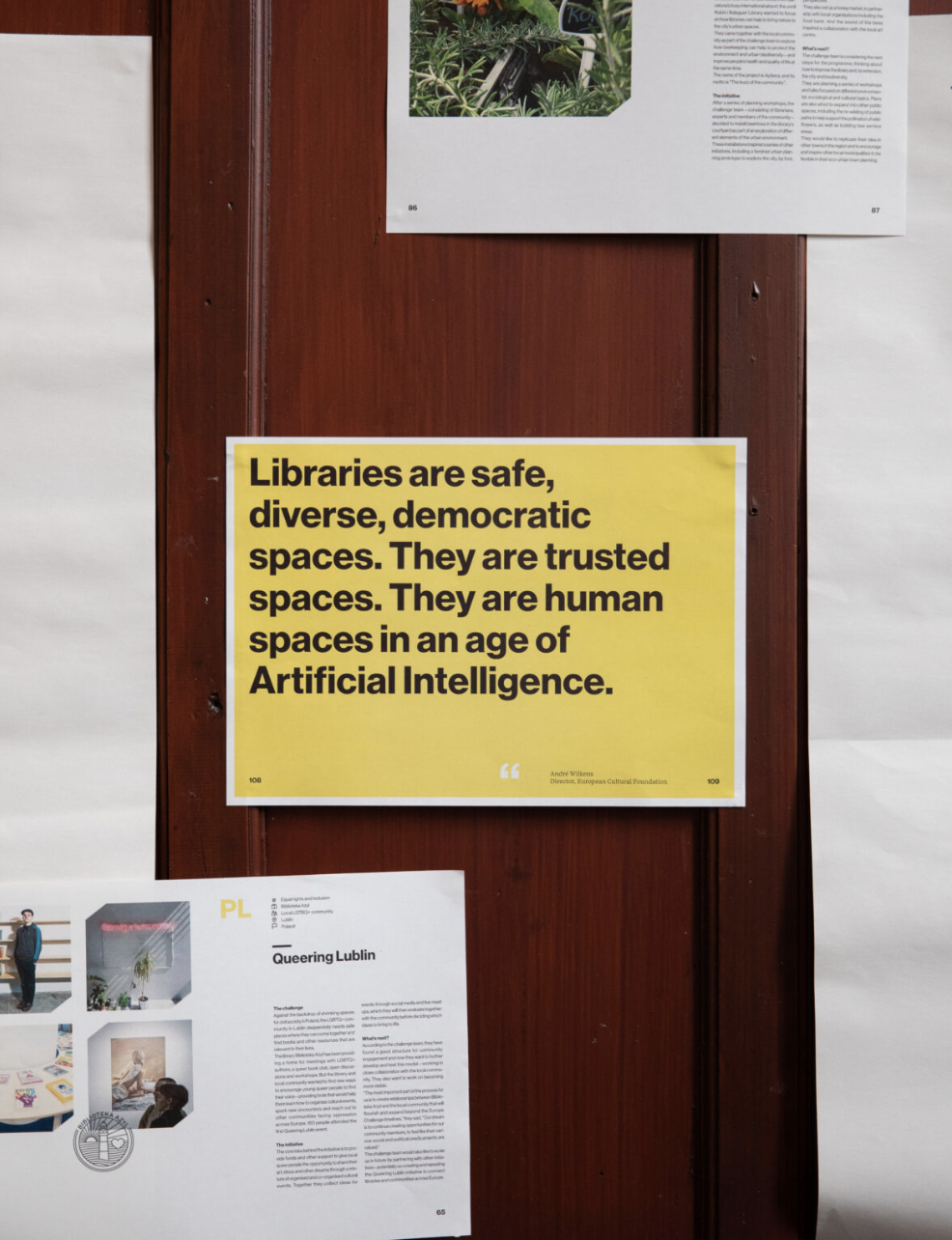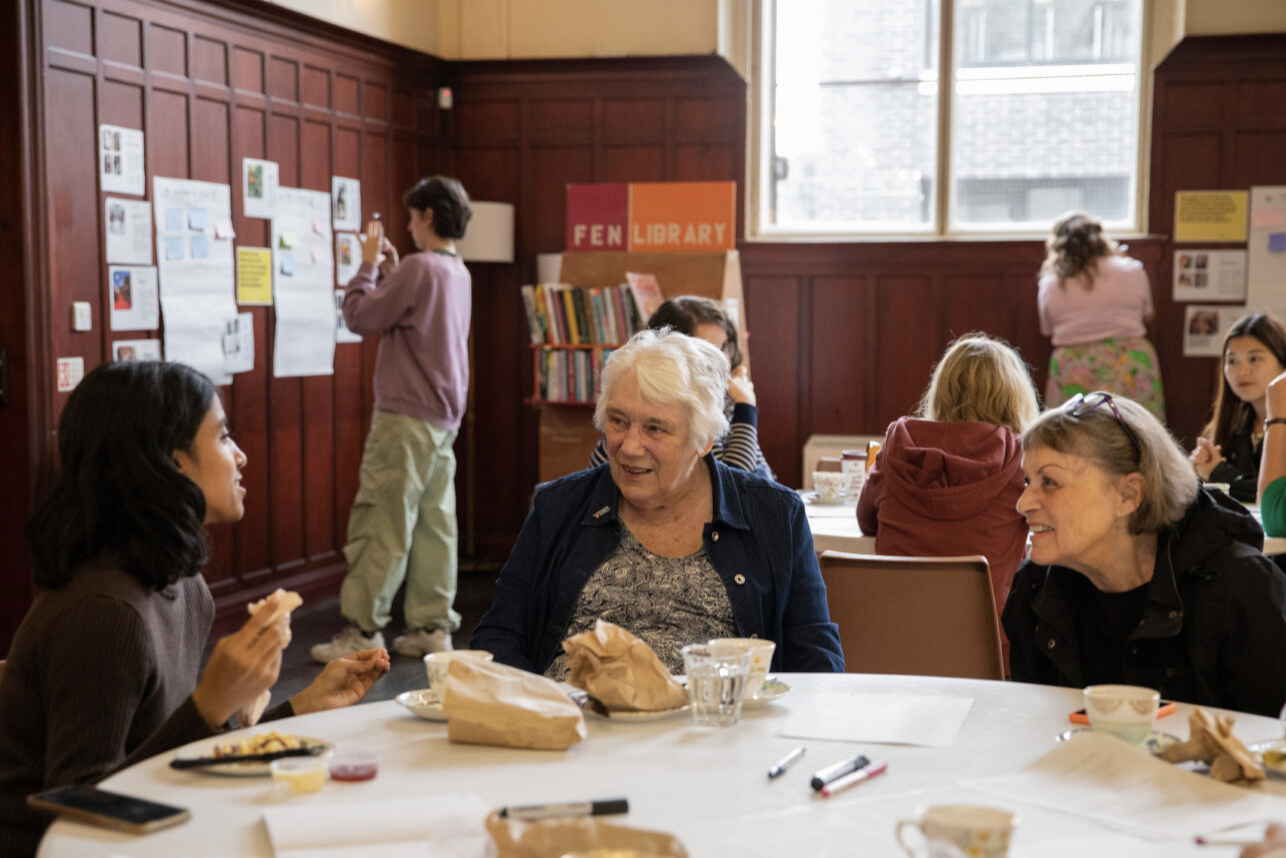As everyone made themselves comfortable in the Women’s Library hall, housing exhibitions and archives and no small amount of forward thinking itself, Wendy introduced the event, inviting us all to “share ideas and imagine different futures together” as we move forward from our current mode of Surviving, of budget cuts and closures and pandemics, towards Thriving. We were lucky enough to hear from two sister organisations who would provide us with an abundance of joy, food for thought and forward-thinking inspiration.
First up, we welcomed Marion, Dennis and Tarus from Book Bunk, who reminded us that libraries can be “more than just buildings with old dusty books” but rather “vibrant hubs”. Book Bunk was founded in 2017 by two incredible women with a belief that art and literature can be “a catalyst for transformational social change”, and a mission to take Nairobi’s public libraries and restore, revitalise and reimagine them as “spaces of inclusivity, heritage and shared experiences”.
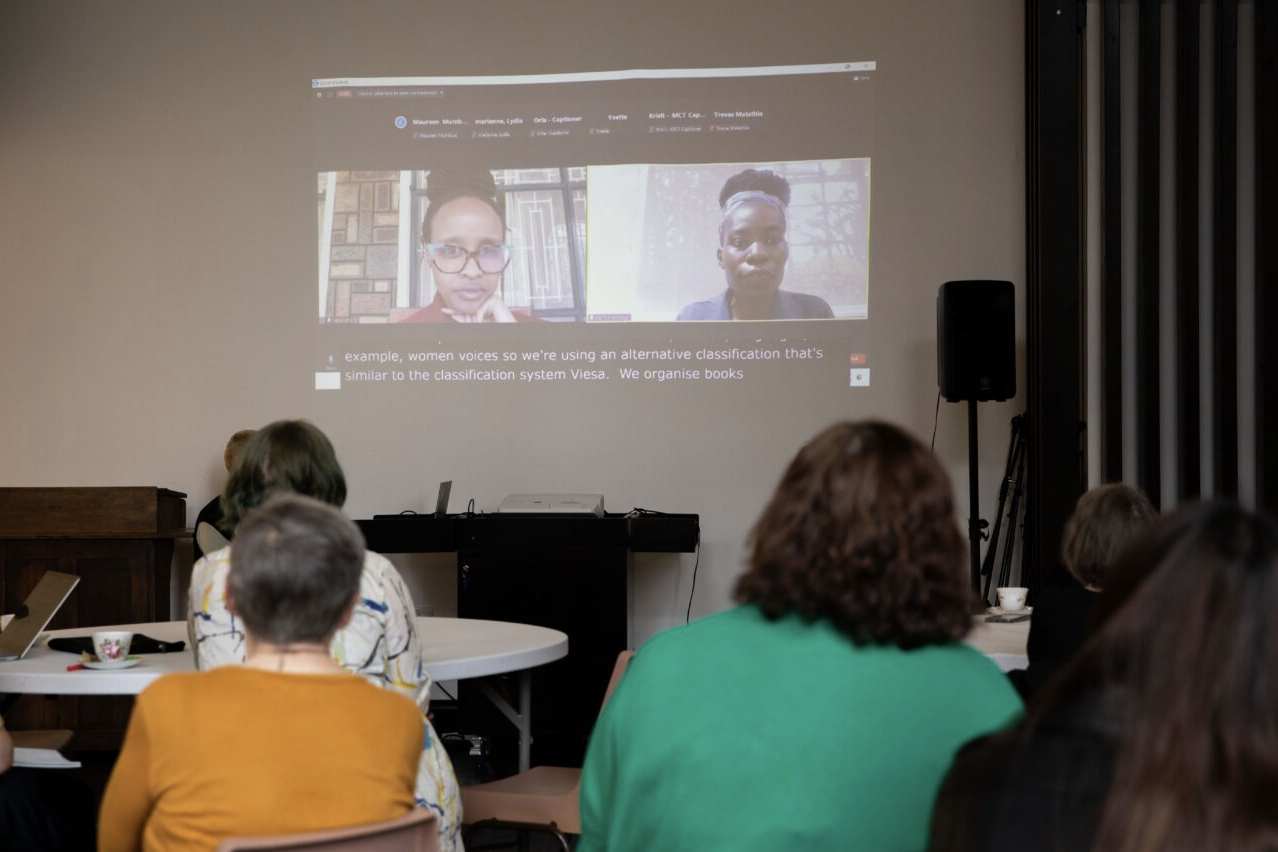
Listening to Marion and Tarus from Book Bunk
Realising that traditional library systems “did not represent our cultural African experiences, or our African voices”, Book Bunk were inspired by Glasgow Women’s Library to develop a custom classification system so that the collection was shelved under headings that better represented the community of library users, and gave voice to previously under-represented and absent voices. They are in the process of using technology to digitise their whole archive, and an online library management system to make it more accessible outside of the physical library space. This commitment to community accessibility is obvious in all of their work.
Next, we welcomed Ulla from Oodi Central Library in Helsinki. From the outset of Ulla’s presentation it is clear that Oodi has accessibility at its core – the massive flagship library is sited directly across the road from Helsinki’s main train station, in the city’s Cultural District. Technology and architecture combine to allow for physical accessibility – guiding marks for the visually impaired, sound beacons and induction loops. The Principles For A Safer Library were defined before the physical building was even opened, making concrete the need for physical and emotional safety, and the absolute intolerance of discrimination and harassment, as well as the encouragement of “idle hanging out”.
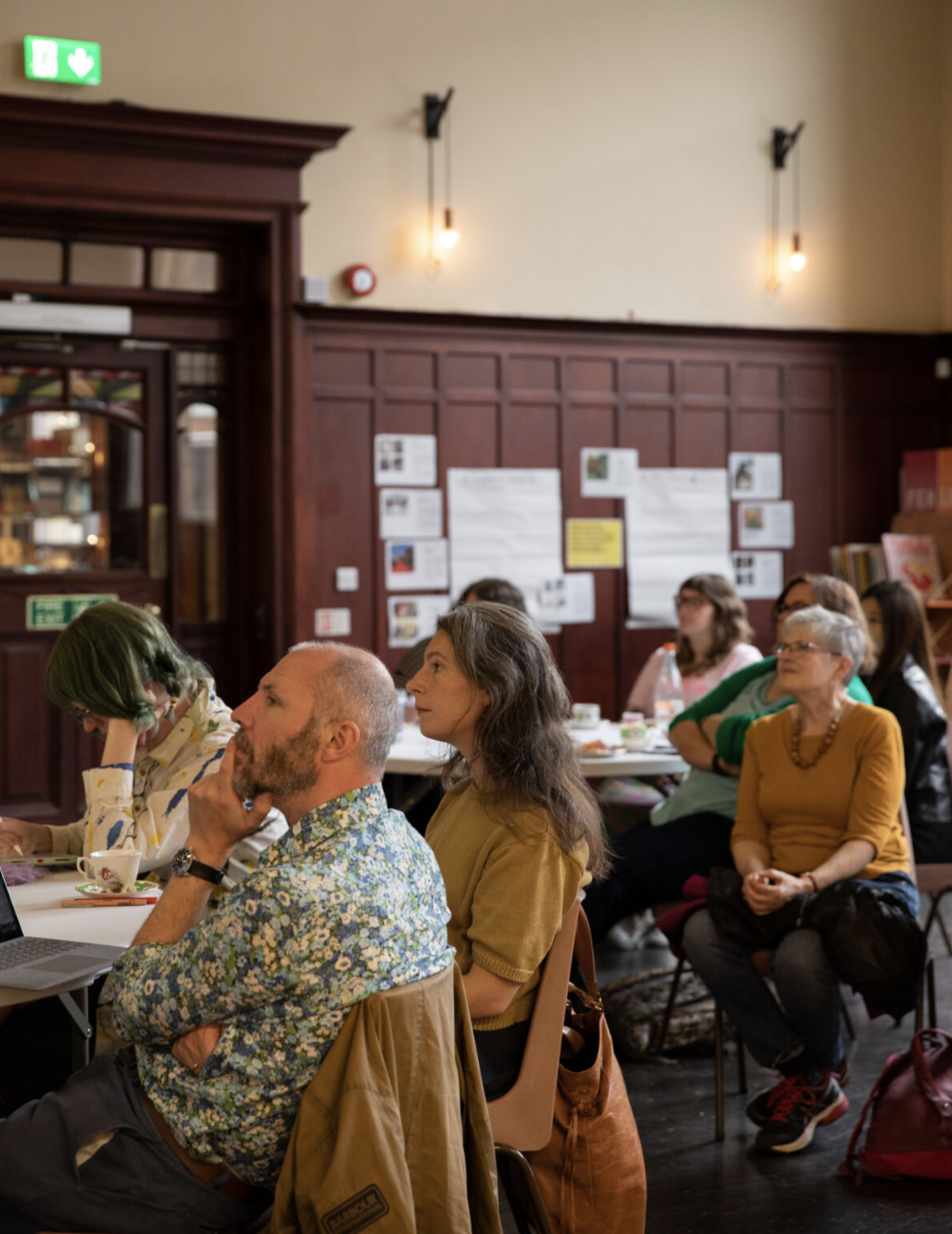
Listening to Ulla from Oodi
Opened in 2018, Oodi differs from many other libraries in that they are a Developmental Library – written into their purpose is to try new things and then share these experiences with other libraries. The city of Helsinki follows a ‘participatory model’, and its main library is no different, allowing for the knowledge and expertise of the local communities to be present in all things. This was an essential part in the planning and building of Oodi – even the name (which translates to ‘ode’, a lyrical poem) was the result of a naming competition open to the public.
These presentations, and some frankly incredible tea and scones, served to inspire the conversations that filled the second half of the event, as we all imagined what we would like our libraries to look like in Scotland. I will refer to this imaginary future library henceforth as The Library, or Dream Future Library if I’m feeling more romantically inclined (and if Oodi gets to call its third floor ‘Book Heaven’ then I don’t see any reason to rein it in to be honest!).
Keeping It Green, and considering sustainability, was central to both organisation’s principles, as well as to the group discussions afterwards. One of Book Bunk’s many projects, Green Bunk, engage in what they refer to as “interventions into public spaces”, creating green spaces and communal gardens adjoining their libraries. This benefits the library users and Nairobi residents in general, whilst working towards the organisation’s larger goal of being carbon neutral by 2027. Event participants felt that having nature as an integral part of The Library would not only have environmental benefits, but also help with mental wellbeing – somewhere green and quiet, to breathe and read, even hold outside events when the Scottish weather allows!
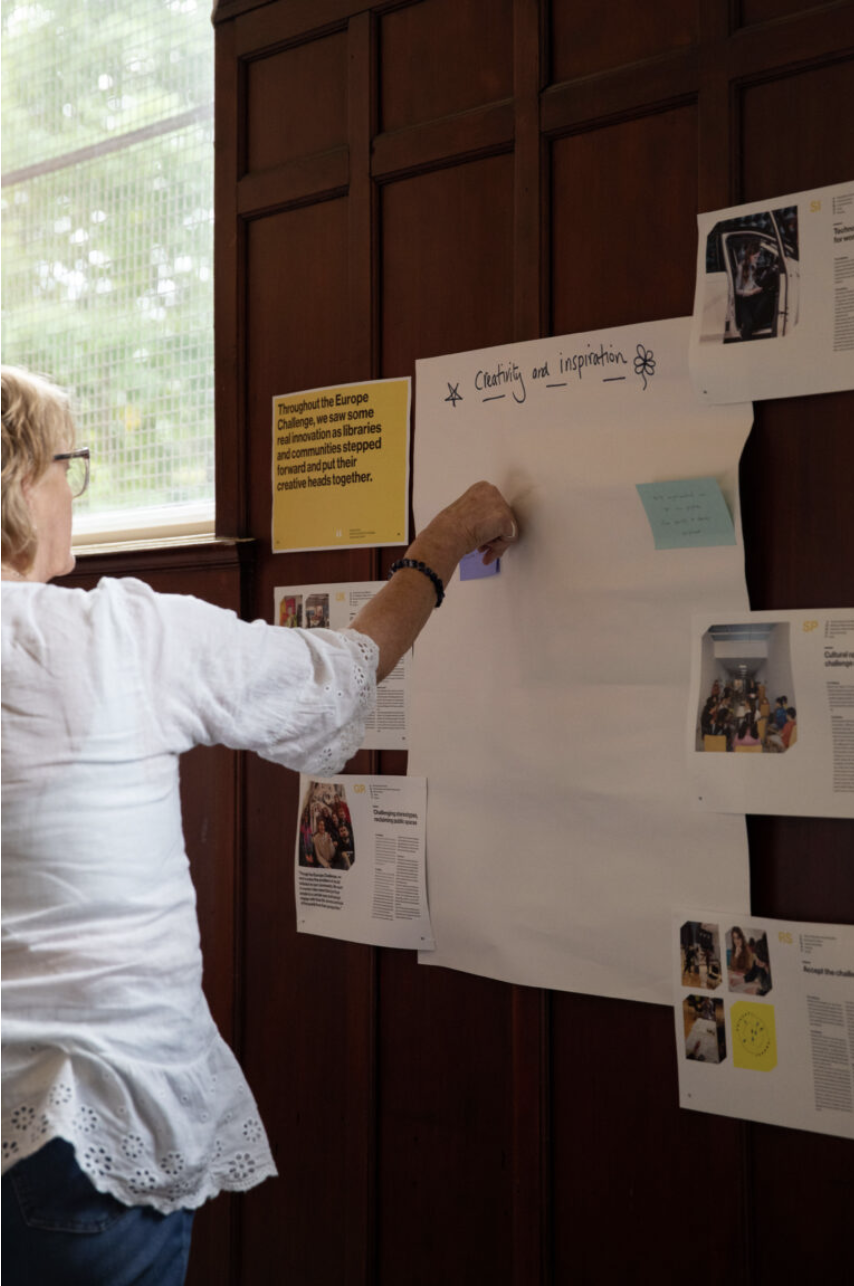
Sharing our thoughts about ideas around the room
Libraries inherently encourage a circular economy, but Oodi provides a model for taking that beyond just the traditional books, films, music. Oodi lends out or allows use of, completely free of charge: games; sports equipment including kids’ bikes and skateboards; household and power tools; musical instruments; even “trash pickers”. They encourage a sharing of items and a sharing of space, and have regular mend and repair hubs alongside their maker space. Allowing library users to borrow items and repair their own items means less money being needed, and less wastage in the world, and will be very important in The Library.
There were two more recurring themes that came up in the presentations and the in-room discussions. Firstly, the importance of community, and being of communal benefit. Oodi is open to the public from morning ‘til night, seven days a week, allowing people to “use the services spontaneously”, and removing a barrier for accessibility. Along with community availability, both organisations’ fight for community ‘ownership’ – that the library users feel that this library belongs to them and is built for their use.
The planning stages of the libraries in both Nairobi and Helsinki involved community participation, with surveys, focus groups and exhibitions involving the community so that they could have input into the services to be offered to them. As Ulla says, there can be challenges to having full community participation. Where some people want complete silence, others want lots of events, and sadly one user’s dream of an ice-cream machine in the children’s section of Oodi could not come true! (Consider this my official suggestion to GWL that we make this happen, I know Wendy’s on board!).
In our Dream Future Library, the community is also essential for the programming. In the same way that Oodi encourages the general public to run their own events in the library, and provides a variety of spaces for these, from test kitchens and meeting rooms to public performance spaces, so The Library will have community involvement central to its principles, and volunteers allowing for greater outreach work. It will provide a space for “social and intergenerational connections”.
The final recurring theme was the library as both tool and toolbox. The Library should be an open and accessible space to help the community. It should also provide the tools to that community that they might help themselves. This can be from literal tools, as with the Urban Workshop, or makerspace, on Oodi’s second floor. It can also be in the form of resources. In response to customer feedback requesting guidance on how they could move from THINKING to DOING when it comes to climate change, three of Ulla’s library colleagues developed The Activist Diploma, encouraging action and activism, and sharing information. Future Dream Library will be “a space full of tools”, providing both “material resources” AND opportunities for learning and discussion.
